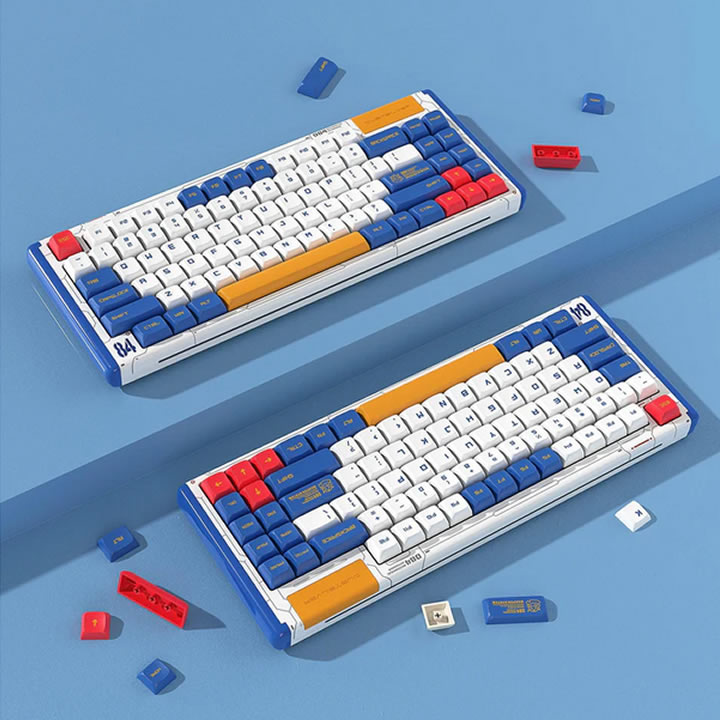In the realm of computer peripherals, there are keyboards known as mechanical that have captivated the attention of amateurs as well as experts. Mechanical keyboards have attracted a cult-like following due to their pleasing clickety-clack sound and sturdy construction.
The feeling of typing on one of these keyboards is unlike any other and goes beyond the scope of simple functionality.
In a market saturated with membrane keyboards, mechanical keyboards stand out due to the distinct tactile feedback they provide, their longevity, and the personalization choices they offer.
Mechanical keyboards harken back to the days when typewriters were prevalent, adding a touch of nostalgia while simultaneously delivering great performance.
The magic of mechanical keyboards is waiting for you to discover it, whether you’re a gamer looking for the highest level of responsiveness, a programmer desiring the highest level of precision, or a writer searching for the ideal keystroke.
Let’s investigate the marvels of mechanical keyboards and find out what exactly sets them apart from other types of keyboards.
What are cute mechanical keyboards?
Cute mechanical keyboards use discrete mechanical switches beneath each keycap, as opposed to conventional membrane keyboards. The use of these switches, which are made up of springs and metal contacts, results in a typing experience that is both more tactile and precise.
The switch will register the activation of a key when it is pressed, and it will then offer distinct tactile feedback as well as an audible click. It is something that many users find to be pleasurable.
History of cute mechanical keyboards
Cute mechanical keyboards have their roots in the early days of typewriters, which may be traced back to those early days. The printing of characters onto paper was accomplished by these dependable devices through the use of mechanical key switches.
These switches eventually made their way onto the early computer keyboards, giving users a tactile feel that was comparable to that of using typewriters. However, the introduction of more affordable membrane keyboards in the consumer market throughout the 1980s led to a drop in sales of cute mechanical keyboards in that sector.
What makes mechanical keyboards so special?
Tactile Feedback: The tactile feedback that mechanical keyboards offer is one of the most appealing features of these keyboards. Users can feel a gratifying sensation with each keystroke, which provides them with a sense of control and precision.
Touch typists and gamers, both of whom rely on fast and accurate input, will benefit enormously from receiving this feedback. Not only does the different feedback give an extra degree of satisfaction to the experience of typing, but it also helps reduce the number of typing errors made.
Longevity: Mechanical keyboards are constructed to survive severe usage for an extended period.
Because each mechanical switch is more robust than the rubber domes used in membrane keyboards, mechanical keyboards are an excellent long-term investment for individuals who spend hours at a time typing or playing video games.
The fact that these switches can withstand tens of millions of keypresses guarantees that the keyboard will continue to be dependable and fully operational for many years to come.
Personalization: Mechanical keyboards give users a great deal of leeway in terms of personalization possibilities.
Users have access to a wide selection of switch types, each of which possesses its own set of distinctive properties, including actuation force and aural feedback, among other things. Due to this, people can choose a switch that corresponds with their preferences and methods of typing.
Users can personalize their typing experience and add a bit of their flair to their keyboard layout because keycaps are easily replaceable and can be customized with a wide variety of colors, materials, and designs.
Benefits of using special mechanical keyboards
A better typing experience may be had with mechanical keyboards thanks to the tactile feedback and accurate actuation they offer. It results in increased typing speed and accuracy.
The different feedback enables users to build a rhythm, which results in a typing experience that is both more efficient and more fun.
It doesn’t matter if you’re a student, a writer, or a programmer; the responsive nature of mechanical keyboards can dramatically improve your overall typing comfort and the amount of work you get done.
Finger strain and tiredness can be reduced thanks to the ergonomic design of mechanical keyboards, which, when combined with tactile feedback, can help minimize weariness.
When compared to membrane keyboards, the actuation force required to register a keypress on mechanical keyboards is frequently smaller, which lowers the danger of repetitive strain injuries.
Typists can develop a lighter touch as a result of the regular tactile input, which helps to minimize the impact that typing has on their fingers and wrists, particularly during sessions that last a long time.
Conclusion
The allure of mechanical keyboards lies in their ability to elevate the typing experience to new heights. The tactile feedback, durability, and customization options set them apart from their membrane counterparts.
These keyboards have a rich history rooted in the mechanical switches of typewriters, and they have made a remarkable comeback in recent years.
Whether you’re a professional seeking enhanced productivity, a gamer aiming for improved performance, or a typing enthusiast appreciating the satisfying keystrokes, mechanical keyboards deliver on their promise of magic.
While they may come at a higher price point, their benefits in terms of typing precision, longevity, and personalization make them a worthy investment. Embrace the world of mechanical keyboards and unlock the true potential of your fingertips.

